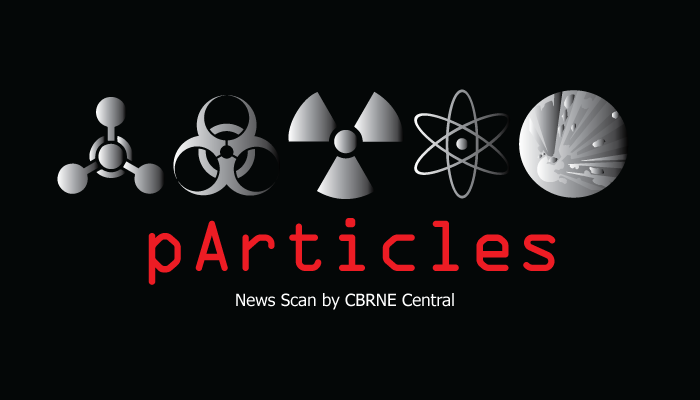Topics in this issue include first responder wearable technologies, nuclear whistle-blowers, USAF EOD robots, 911 caller location technology, humanitarian de-mining operations, and more…
In This Article
The Pope Is Lining Up to Ban Nuclear Weapons
The church and the U.S. Conference of Catholic Bishops have worked actively in support of arms control and disarmament agreements, including the 2015 Iran nuclear agreement, the 2010 New START treaty between the United States and Russia and the 1996 nuclear test ban treaty. When the pontiff speaks in Washington and New York this week, he will likely take the church position a step further. Defense One >>
S&T to Demonstrate Wearable Technologies for First Responders
Through the EMERGE Accelerator Program innovators have received early market validation, mentoring and access to private investment for their solutions that help the “responder of the future” save lives and carry out their mission. These new ideas focus in the area of wearable technologies, such as body-worn electronics, advanced sensors, and integrated voice and data communications embedded in a responder’s gear. Domestic Preparedness >>
Nuclear Whistle-Blower Vanunu Is Israel’s Edward Snowden
An interview conducted with Mordechai Vanunu earlier this month was fascinating and informative. This was the first time that the Israeli public got a look at the life and the world of the person who in Israel is considered the ultimate traitor. For the first time, Vanunu was making an appearance on an Israeli media outlet as a flesh-and-blood human being. Center for Nonproliferation Studies >>
Smiths Detection Wins First Major Airports Contract for IONSCAN 600 Trace Detector
Smiths Detection has been awarded a contract by the Spanish Airport Operator (Aena) to equip 24 of its airports with the new IONSCAN 600 explosives trace detector for passenger screening. Almost 300 of the recently launched systems, manufactured by Smiths Detection. Government Security News >>
Why Aren’t Americans More Resilient in the Face of Terrorism?
One of the remarkable surprises about the post-9/11 era is the relative lack of successful terrorist attacks on the U.S. homeland. Although terrorists struck at the Boston Marathon, Fort Hood, and other locations, their success rate in the last 14 years is poor. The dire predictions made just after the 9/11 attacks about a rapid pace of mass-casualty strikes to come, including some with unconventional weapons, have not been borne out. Brookings >>
Spy Agency’s Open Source Mapping Tool Helps First Responders Save Lives
Disasters can strike swiftly and suddenly, like a tornado in the heart of Oklahoma. The first 24 hours after a natural disaster are critical, and both first responders and analysts don’t have a lot of time to parse through multiple information channels to get accurate, updated information. Enter GeoQ, a Web-based, open source workflow and mapping platform. NextGov >>
Finding 911 Callers Instantly
According to the Federal Communications Commission (FCC), around 70 percent of 911 calls today are made via mobile phones. Yet when fielding such calls, dispatchers rely on landline-based systems that sometimes fail to pinpoint a mobile caller’s location quickly — or at all — during time-sensitive emergencies. Experts have estimated that 60 percent of 911 calls come through with inaccurate or no location data. MIT News >>
Israeli Start-Up Snags USAF EOD Robot Award
After competing for more than two years with America’s leading robot providers, an Israeli newcomer to the industry through its US subsidiary has snagged a $25 million US Air Force contract to provide its man-portable, stair-climbing, battle-tested system in support of Explosive Ordnance Disposal missions. Defense News >>
Rosatom Plans Next Phase of Nuclear and Radiation Safety
Rosatom will soon present the Russian government with its report for the federal target program (FTP) for nuclear and radiation safety for 2016-2025, director general Sergey Kirienko told Prime Minister Dmitry Medvedev during a meeting on 18 September at Government House. The corporation has completed 108% of the FTP for 2008-2015, and despite a cut in state funding of RUB8.4 billion ($127 million), Kirienko said. World Nuclear News >>
Morpho Awarded Portugal Airports Contract for Itemiser 4DX Explosives Trace Detectors
Following competitive testing closely supported by MicroSegur, Itemiser 4DX was selected to meet the requirements of new EU legislation for enhanced explosives screening of passengers at five airports throughout Portugal. Building on 15 years of Itemiser systems protecting travelers at leading global aviation hubs, Itemiser 4DX quickly detects and identifies trace amounts of explosives on skin, clothing, carried items, bags, vehicles and other surfaces. Government Security News >>
Mini-Robot to Support Air Force’s Bomb Disposal Teams
The Israeli robot company Roboteam has won a prestigious contract award worth $25 million to deliver and support small, lightweight MTGR Explosive Ordnance Disposal (EOD) robots to the U.S. Air Force. The contract funds the delivery and support of the robots through 2022. Defense Update >>
FLIR Encourages Developers to Put Thermal Imaging to Creative Use
The company recently branched into the consumer arena with the FLIR One, which turns iOS and Android devices into thermal imaging cameras, and the FLIR FX, a line of home-monitoring systems. Now, FLIR is taking the thermal imaging core of these consumer products, the FLIR Lepton, to makers, manufacturers and developers, to see where their imaginations take them. Smaller than a fingernail, Lepton is a long-wave infrared imager that is 10 times less expensive than traditional thermal cameras. eWeek >>
Humanitarian De-Mining
CBRNE Ltd team of Dr Irina Stanciugelu and Dr Usher and Dominic Kelly amongst the participants of Project D-BOX demonstration and evaluation of humanitarian de-mining tools at Szczytno, Poland in May 2015. D-BOX tackles the burning issue of anti-personal landmines and cluster munitions remaining from armed conflicts. CBRNE Ltd >>


